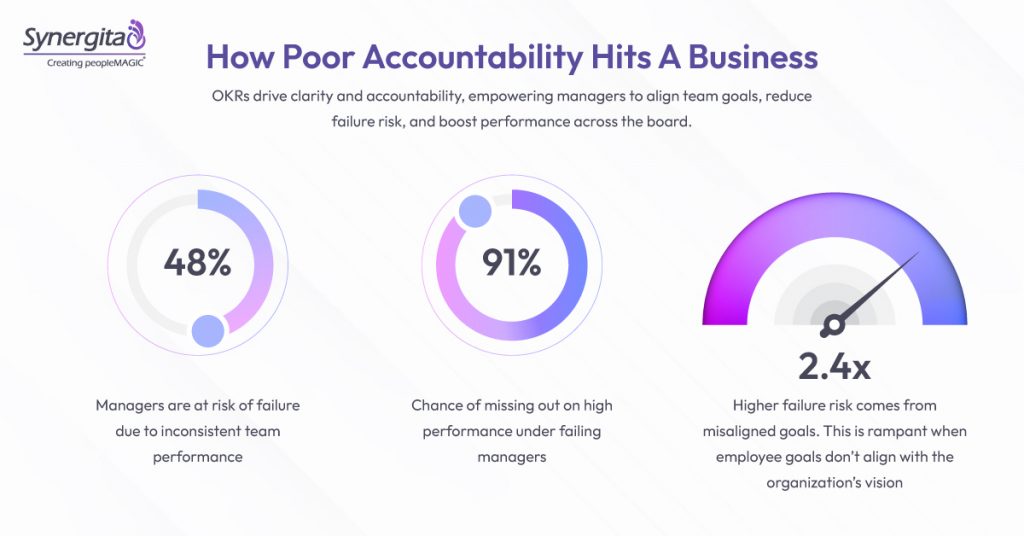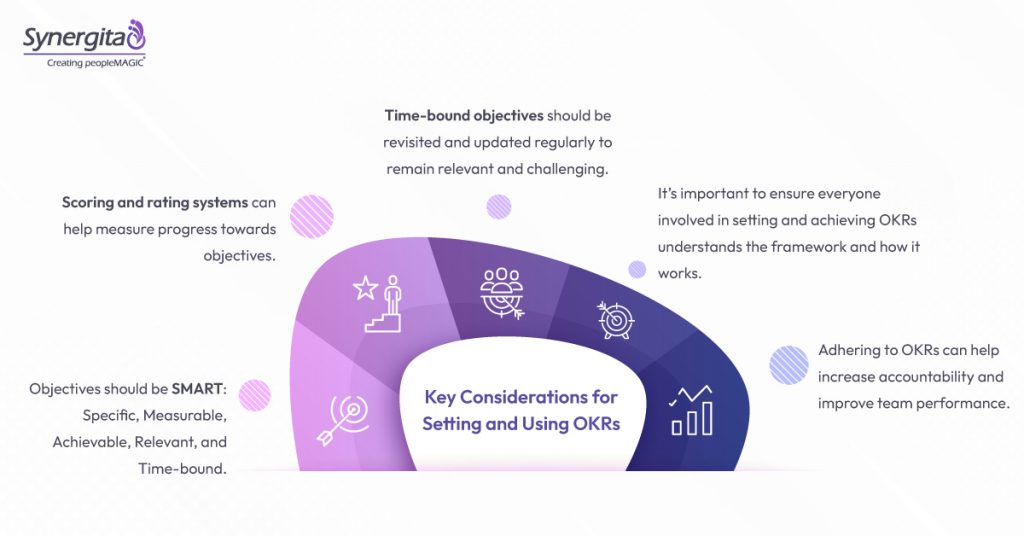Accountability serves as the foundation for integrity, but what does it truly mean in a business context? In essence, accountability means that each employee is responsible for their actions and recognized for their contributions in achieving results. Managers play a critical role by setting clear, measurable expectations and ensuring open communication so that every team member understands their role and responsibilities within the organization. When expectations are unmet, managers must address the gaps, while also acknowledging and celebrating individual and team achievements when goals are successfully reached.
Many employees may feel disengaged and unmotivated in their work: nothing gets done when no one is held accountable for their actions. But how do you foster accountability in the workplace? This OKR guide will focus on how employees, managers, and leaders leverage the OKR framework to practice accountability in real-life.

OKR Guidelines for better Accountability
The OKR framework is a popular tool that can be used to improve accountability in your workplace by helping managers better understand their employees. The framework consists of Objectives and Key Results. In the Objectives quadrant, managers set specific, measurable goals for their employees. They should also be aware of the company’s mission and vision to ensure the goals align with those ideals. In the Key Results quadrant, managers measure whether their employees meet their objectives.
The OKR framework can be helpful for management to understand their employees’ strengths and weaknesses better. Managers can provide appropriate feedback and help employees reach their goals by implementing employees’ objectives and key results.
Setting specific objectives is a cornerstone of effective accountability. Here are a few key things to keep in mind when creating or using OKRs:

How to Practice Accountability Effectively
Accountability is a vital ingredient for a productive workplace. Employees need to know what expectations and goals their managers have for them and how they can be held accountable for meeting those expectations. Business leaders need to take the lead to put in place accountability practices in the workplace, so they can create an environment where it is easy for employees to meet expectations. Here are some ways to practice accountability effectively in the workplace:
- Hold regular meetings in which everyone is expected to present their progress towards organizational goals. This gives employees a chance to hear from their managers directly about their goals and for team members to provide feedback and support. OKR softwares with its top-down and bottom-up alignment framework makes it easy to record progress without the need for a weekly meeting.
- Communicate expectations upfront. Make sure that everyone knows what needs to be done for a project to be successful, and make sure that all deadlines are clearly set. It will help keep employees on track and motivated toward meeting expectations. Your OKR software should help you monitor the performance of your projects. It should provide a visual map of how far along your team is and highlight the best ways to stay on track.
- Identify problem areas early and take appropriate action. Your OKR dashboard can spot differentiating teams and understand their tactics. It provides real-time insights and tracks the performance metrics of your organization’s teams. It allows you to take action on underperforming teams sooner rather than later.
- Hold employees accountable for their actions. If an employee does not meet an expectation, take measures such as an immediate one-on-one review or issuing a formal warning. If the employee doesn’t change their performance, consider more drastic actions such as termination as a final resort.
Examples of Accountability at the Workplace
Regular check-ins with your supervisor will allow you to discuss your progress towards meeting goals, receive feedback, and ask for help or clarification.
Here are a few examples of accountability at work, even as you spell out your expectations through meetings and using OKR guidelines.
- Making the most of your working hours: It can be done by tracking your time using a time clock or timesheet, where you dedicate time for deep work, emails and meetings.
- Accountability for meeting deadlines: This may involve setting your own personal deadlines, or it may mean working with a supervisor or team to establish deadlines. If you cannot meet a deadline, you may need to explain why and develop a plan for how you will be able to complete the work.
- Responsibility for your performance: You will be held responsible for achieving the goals that you have set for yourself. It can include being held accountable by your team leader, team, or even yourself.
- Adhering to company policies and procedures: You are responsible for following the company’s rules and regulations. Respecting company values while working to achieve its goals are integral.
Use OKRs to maintain focus and ensure Accountability
The best way to maintain accountability and ensure your goals are in focus is to take time beforehand to think about what they should be. OKRs can’t be measured by the number of hours spent working because they’re meant to focus on what’s most important and give a benchmark for what success looks like. Writing good ones takes time, thought, and discipline.
As a leader, it’s crucial to use accountability, alignment, and focus to set your team up for success. Focus on practicing what you preach by using OKRs to communicate goals and objectives and taking action on continuous feedback to close the loop between strategy, people, and results.
With Synergita OKR, this process becomes easy. The software enables real-time performance tracking, transparent goal-setting, and continuous feedback, helping teams stay aligned and accountable. The OKR dashboard offers clear visibility into team progress, making it easy to spot and address issues early on. These insights help managers can build a culture of accountability while driving trust and productivity across the organization.
Conclusion
Accountability is the cornerstone of a healthy workplace. It is the foundation for maintaining a productive, positive environment where trust is built across the workforce. Holding employees accountable for their actions drives engagement and motivation, encouraging continuous improvement. When accountability becomes a standard practice, it generates a positive ripple effect throughout the organization. Try Synergita OKR and experience the difference it makes to your business.
Relevant Articles
